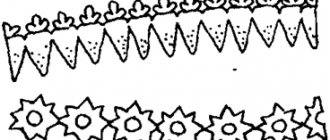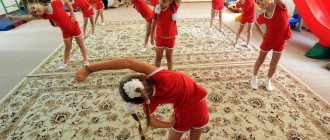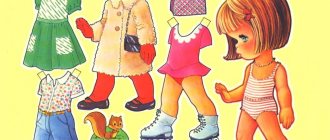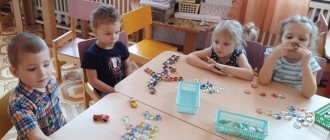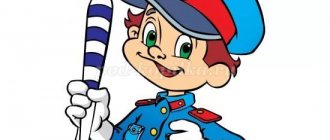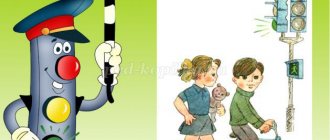Games for the cognitive development of children of the second younger group
The purpose of games aimed at the cognitive development of a child is:
- development of interests, cognitive activity and motivation, curiosity;
- formation of cognitive skills;
- the formation of the child’s ideas about himself and other people, about the objects of the surrounding world, their properties and relationships between them;
- familiarization with the concepts of “Fatherland”, “homeland”, the basic socio-cultural values and traditions of one’s people.
Game “Into the forest to pick mushrooms”
Goal: developing ideas about quantitative relationships between objects “one - many”.
To play the game, you need to prepare an image of a large clearing on which several mushroom figures are located. Children need to be given baskets.
- Children, we came to a mushroom clearing in the forest. Look how many mushrooms there are here? (A lot of).
- And now each of you will pick one mushroom. Tell me one by one how many mushrooms are in your basket. How much do you have, Vitya? (I have one mushroom).
The teacher should ask each child.
- Let's put all the mushrooms in my basket. How many mushrooms did I get? (A lot of). And you? (No one).
Game "Wrap a gift"
Goal: to form the concept of “big”, “small”, “thick”, “thin”; learn to correlate objects by size.
The presenter invites the children to go to Mashenka’s birthday party. To do this they need to buy a gift. Everyone chooses a doll (the pictures show dolls of different sizes and thicknesses).
Now you need to pack the gift, and for this the children need to “buy” a package that will correspond to the size of the doll. At the same time, each child must explain his choice of packaging: “I bought this package because my doll...”.
After this game, you can discuss how to properly give and accept gifts.
Game "What grows where"
Goal: learn to group objects into vegetables and fruits; develop speed of reaction, discipline, endurance.
For the game, you need to prepare pictures depicting a vegetable garden and object pictures (or dummies) of vegetables and fruits.
Children are divided into two teams: gardeners and vegetable growers. At the signal, each team must collect their items. The team that completes the task faster wins.
Games for social and communicative development
Games aimed at the social and communicative development of a child have the following goals:
- perception of norms of social behavior;
- development of communication skills, cooperation skills with other children and adults;
- development of empathy;
- developing a sense of respect and belonging to one’s family and peer group;
- formation of a positive attitude towards work and creative activity;
- developing safe behavior skills.
Game "Who needs what"
Purpose: to introduce the main characteristics of such professions as doctor, hairdresser, baker; develop a positive attitude towards work.
For the game you need to prepare items necessary to perform professional activities (syringe, scissors, comb, bowl, etc.), as well as details of the corresponding costumes. Children are assigned to roles.
First, you need to have a conversation with the children about the professions of a doctor, hairdresser, baker (you can choose others). It is necessary to find out what the kids know about their professional activities. You can ask which of the children have parents with such professions.
During the game, each child first receives costume parts. He must understand what profession he needs to represent. If children find it difficult to answer, the leader helps them.
Next, a game is played with objects that are stacked on the table. Children need to choose a subject that is necessary for their professional activities. After this, you can invite them to show how this item should be used.
Game "Yes or No"
Goal: to cultivate a caring attitude towards health; learn to manage your behavior, understand what actions are correct.
Children stand in a circle. The teacher should name various situations, and the kids should, if the correct behavior is announced, clap their hands, if incorrect, stomp their feet.
Game "Who to be friends with"
Goal: to teach children to understand people’s facial expressions; develop empathy, cultivate friendliness.
Place pictures of children with different facial expressions on the board. The children are invited to look at the pictures and choose a friend. The facilitator should ask them to explain their choice.
Card index of didactic games in the second junior group according to the Federal State Educational Standard with goals
The Federal State Educational Standard for Preschool Education identifies the preschool period as a separate, self-significant stage of education, focused on the formation of a successful personality. The stage of formation of personal and activity skills begins in the fourth year of a child’s life. The teacher needs to have a card index of didactic games in the second junior group according to the Federal State Educational Standard with goals aimed at the implementation of five educational areas.
Preschool education does not aim to prepare a child for school and in no case should it copy the forms of school life. Development and learning should be carried out through games and other children's activities.
